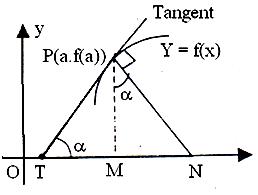Subtangent and Subnormal
Sub tangent and Subnormal
In the figure given above PT' is tangent to the curve at point P of the curve and PN' is normal. Point T is on x axis where tangent intersects it and point N is on x axis where normal PN' meets it.
TM' is called sub-tangent and MN' is called Subnormal.
From figure
TN' = PM' cot a
= (f(a))/(f' (a)) (f'(a) ≠ 0)
Also, MN' = PM' . tan a
= f(a) . f'(a)
Illustration:
Show that the sum of the intercepts of the tangents to the curve
√x + √y = √a on the coordinate axis is constant.
Solution:
The equation of the curve is √x + √y = √a.
Differentiating with respect to x, we have
1/2 x-1/2 + 1/2 y-1/2 dy/dx = 0 => dy/dx=-√(y/x).
The equation of the tangent at (x1, y1) is
y - y1 = √(y1/x1 ).
The intercept on the x-axis = √(ax1 ).
The intercept on the y-axis = √(ay1 ).
Sum of the intercepts = √(ax1 ) + √(ay1 ) = √a (√(ax1) + √(ay1))
= a, which is a constant.
Illustration:
The curve = ax3 + bx2 + cx + 5 touches the x-axis at P(-2, 0) and cuts the y-axis at a point Q where its gradient is 3. Find a, b, c.
Solution:
Slope of the tangent to the curve at (x1, y1) is
[dy/dx](x1,y1) = 3ax12 + 2bx1 + c
The point Q is (0, 5).
Since the curve passes through (-2, 0),
-8a + 4b - 2c + 5 = 0. ... (1)
Since the slope of the tangent at (-2, 0) is 0,
12a - 4b + c = 0 ... (2)
Since the slope of the tangent at (0, 5) is 3,
c = 3. ... (3)
From (1), (2) and (3), a = -1/2,b = -3/4, c = 3.
Illustration:
Find the equation of tangent and normal to the curve x2 = 8y + 6 at the point (0, - 5/4)
Solution:
Equation of the curve is
x2 = 8y + 6
y = (x2-6)/8
Slope of the tangent to the curve at (0, -5/4) is dy/dx at this particular point
dy/dx=2x/8=x/4
at (0, -5/4) dy/dx = 0
equation of tangent at (0, -5/4)
y + y1 = m(x - x1)
y + 5/4 = 0(x - 0)
y + 5/4 = 0
Normal is perpendicular to tangent, so slope of normal = - 1/(dy/dx).
Since dy/dx = 0 hence the normal will be parallel to y axis and will pass through (0, - 5/4), hence equation of normal at (0, -5/4) is
x = 0
To read more, Buy study materials of Applications of Derivatives comprising study notes, revision notes, video lectures, previous year solved questions etc. Also browse for more study materials on Mathematics here.
View courses by askIITians


Design classes One-on-One in your own way with Top IITians/Medical Professionals
Click Here Know More

Complete Self Study Package designed by Industry Leading Experts
Click Here Know More

Live 1-1 coding classes to unleash the Creator in your Child
Click Here Know More


